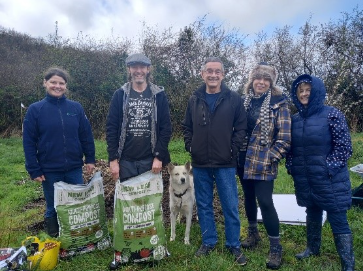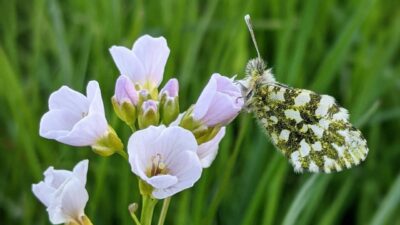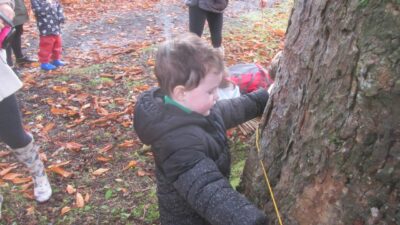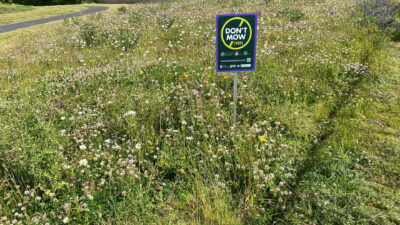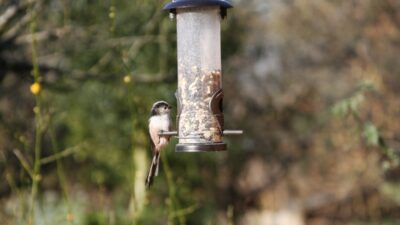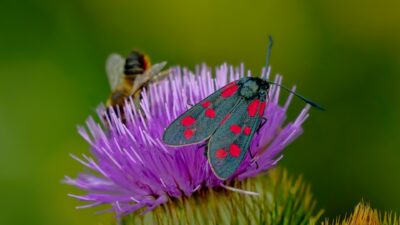Biodiversity: It’s Our Duty
It’s Our Duty
There are European, National and Regional targets set to halt the loss of biodiversity. The EU vision is for better protection of biodiversity in the EU by 2050. In Northern Ireland the NI Biodiversity Strategy has set a target to significantly reduce overall biodiversity loss.
The biodiversity duty is considered a key measure to contribute to these targets and at a Council level, adopting Biodiversity Implementation Plans that focus on internal Council actions and coordinating Local Biodiversity Action Plans, is agreed as an appropriate way to help meet this duty.
What’s involved?
All public bodies, when undertaking their functions, have to take into account the following five areas:
- The protection of biodiversity
- The maintenance of biodiversity
- Enhancing biodiversity
- Restoring biodiversity
- Promoting the understanding of biodiversity both within and outside the organisation
Biodiversity Strategy and Action Plan 2022-2027
The Council’s Biodiversity Strategy and Action Plan (2022-2027) explores the unique biodiversity of the district from the rare boglands to the common garden bird.
It also encompasses the biodiversity crisis that is unfolding worldwide, and the practical steps the Council can take to restore biodiversity locally.
Download the Strategy
Peat Free Compost
Peat-free compost offers numerous benefits for both the environment and gardening practices. By avoiding the use of peat, which is harvested from vital peat bogs, it helps protect these unique ecosystems that serve as crucial carbon sinks and habitats for diverse wildlife. Peat-free compost is typically made from sustainable materials like wood chips, green waste, and coir, reducing the depletion of natural resources. It also promotes better soil health by enhancing soil structure, water retention, and nutrient availability, which can lead to stronger and healthier plants. Additionally, using peat-free compost supports the reduction of greenhouse gas emissions, making it a more eco-friendly choice for gardeners and landscapers committed to sustainable practices.
The council is committed to environmental sustainability and has made a conscious decision to exclusively use peat-free compost across all their grounds and public spaces. This commitment reflects Fermanagh and Omagh District Council’s dedication to protecting vital peat bog ecosystems, which play a crucial role in sequestering carbon and providing habitats for a diverse range of wildlife. By opting for peat-free compost, the council not only contributes to the conservation of these unique natural resources but also sets an example for the community in promoting sustainable gardening and landscaping practices. Additionally, Natural World Products processes the district’s organic waste into New Leaf Peat Free compost. This compost, as part of the circular economy, is repurposed to maintain and enhance planting throughout our district.
Do Your Bit for Biodiversity
Farmers and land owners
- If eligible, sign up to an agri-environmental scheme to further benefit wildlife
- Follow the codes of good agricultural practice
- Leave field margins uncut later in the season for birds, insects and mammals
- Restrict any cutting of hedgerows to every other year, allowing some stretches to flower and fruit each autumn
Businesses
- Sponsor a local biodiversity project and help make it happen
- Create your own wildlife garden in your company grounds. You could build an insect hotel or even sow a small wildflower meadow.
- Volunteer your staff to lend a hand with local conservation projects which will give your team new skills and help local biodiversity.
Community Groups
- Create a community wildlife garden and increase your local sense of pride and stewardship for the environment
- Help plant a woodland or preserve a local bog for the future
- Help biodiversity by starting your own community project – contact the Climate Team at biodiversity@fermanaghomagh.com for advice
- Work in conjunction with a local school to develop biodiversity projects
Individuals
- Help build a better picture of local biodiversity and become a wildlife recorder! Record any sightings of important wildlife and report these to the Ulster Museum’s recording centre, CEDaR. The Fermanagh and Omagh Biodiversity Audit revealed that there are some gaps in habitat and species records, so your help is vital.
- Have a go at wildlife gardening and enjoy the small wonders in your own patch. Or why not create a street garden and encourage your neighbours to do one thing for biodiversity in their gardens too!
- Create your own compost heap, reducing your waste and reducing the need for peat compost
- Report wildlife crime. Incidents such as dumping and water pollution should not be ignored, as these have an impact on local biodiversity. Local people are ideally placed to report such activities and this can go a long way towards preventing further decline of our habitats and species.
- Volunteer! There are always local projects that need the help of volunteers and give people a chance to learn about helping their local wildlife. These could be tree planting days, bird box making, scrub clearance or even hay making. In addition, The Conservation Volunteers, RSPB, National Trust and Ulster Wildlife have ongoing conservation projects taking place throughout the Fermanagh and Omagh area that people can get involved in.
Wildlife Law and You
Hedge cutting advice for home and landowners not under a DAERA scheme
In Northern Ireland, legislation governs the cutting of hedgerows to protect wildlife, particularly during the breeding bird season. The Wildlife (Northern Ireland) Order 1985 stipulates that hedgerow cutting is restricted during the bird nesting period, from March 1st to August 31st, to safeguard nesting birds and their young.
When cutting hedges outside of the recognised nesting period, 1st September – 28th February, best practice is to wait until January and February where possible, to support other wildlife that utilise the hedgerow in the autumn (birds feeding on berries, pollinators using ivy nectar etc). For more detailed guidance, landowners are encouraged to consult with the Department of Agriculture, Environment, and Rural Affairs (DAERA).


